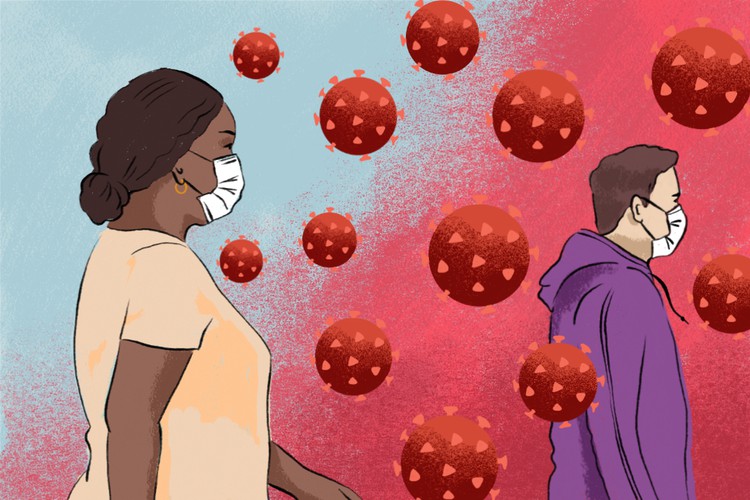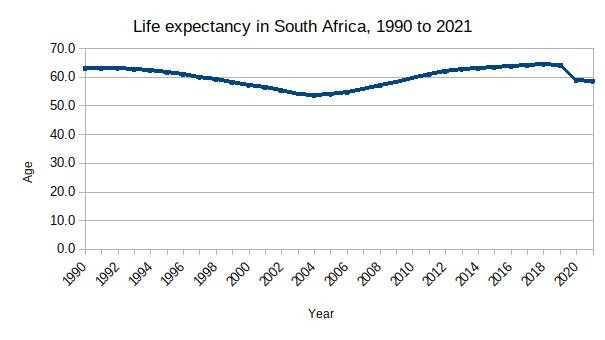Two years into the Covid disaster, where do we stand?
Far fewer people are dying but the disease remains extremely serious
Illustration: Lisa Nelson
Covid began to hit South Africa badly in May 2020.
The Medical Research Council (MRC) has diligently tracked the excess deaths that have come in the wake of the pandemic. It was two years ago this month that the number of deaths in the country started exceeding what was expected based on historical numbers.
As of 7 May, 310,000 more people have died than expected over the past two years. Conservatively, 85% of these deaths are estimated to be directly caused by SARS-CoV-2. This means over 260,000 people in this country have died of Covid.
Our excess death rate has been high but quite a few countries have had it far worse. Also since we’re the only sub-Saharan African country that measures excess deaths with much accuracy and consistency, it’s quite possible other African countries have been hit as badly, or worse.
For the past six months or so, despite the rapid spread of the omicron variant, the excess death rate has dropped a lot. Although omicron and its subvariants are more infectious than any previous variant, a combination of vaccination — over 21 million people have been vaccinated at least once — the high rate of previous infection, most people who are most susceptible to serious Covid disease have already died, and changes to the virus itself have all contributed to making the disease less deadly.
The drop in lethality is good news.
Also, there are new medicines, like Paxlovid (which contains the drugs nirmatrelvir and ritonavir), that are promising treatments for Covid. But they are expensive. The US government pays over R7,500 for a five-day course of Paxlovid, for example. Also, these treatments are not available in South Africa. The South African Health Products Regulatory Authority should get moving — by approving these drugs as well as rapid tests for home use — and pharmaceutical companies should drop their prices and allow generic manufacture of these medicines.
There are important caveats to the good news though. Barring some technological breakthrough, Covid is with us for the long-run. It’ll continue mutating and continue infecting us. Epidemiologists use the word “endemic” to describe this.
Many of us have already had Covid at least once, and most of us will get it several times in the course of our lives. As we get older, we may become more likely to die of Covid. Repeated vaccinations will almost certainly be necessary to reduce the risk of infection, hospitalisation and death.
This graph shows how life expectancy dropped from 1990 to the mid-2000s because of HIV. Then it began rising again with the introduction of antiretroviral treatment in the public sector. The kink at the end of the graph shows the drop in life-expectancy due to Covid. The life-expectancy estimates used to construct the graph are from the Thembisa model.
Covid vs influenza
From the start of the pandemic, influenza has been a useful disease to compare with Covid. That’s because nearly all of us have had the flu, usually a few times by adulthood. We know what it feels like to be sick with flu and we have a good idea of how many people die of flu every year.
Flu kills about 6,000 to 11,000 people in South Africa a year (though this dropped dramatically during Covid). So in a typical two year period we’d expect about 20,000 people to die of flu. This means Covid has been much more than ten times as deadly. In fact Covid has — unequivocally and by a long way — killed more people in the last two years than any other disease, not just in South Africa, but worldwide.
But now that Covid, like flu, is also endemic and not as deadly as it once was, where do we stand?
We are only in May and there have been nearly 23,000 excess deaths this year; certainly most of those have been Covid. Covid is still far deadlier than flu. It remains one of the three deadliest epidemics in the country, along with HIV and TB.
Over the long run SARS-CoV-2 will likely become like the other four coronaviruses that give us a two or three-day common cold that is easy to manage and rarely fatal. But with our current knowledge anyone who predicts how many years this will take is just guessing. In the meanwhile it’s even possible that variants will arise that cause a serious spike in the death rate.
There’s another serious way in which SARS-CoV-2 currently differs from the flu virus. It is mutating and spreading extraordinarily quickly. The percentage of the population that contracts flu varies quite a bit from year to year, and the illness is concentrated in winter. But 10% is a reasonable average estimate.
Covid variants appear to be coming along at a much faster rate than flu ones and a lot more than 10% of the population is being infected annually. Also there isn’t yet convincing evidence that Covid has much of a seasonal preference; our fifth wave started in April, and our previous one was in summer.
In other words, Covid also causes a lot more illness and, consequently, sick leave, than flu.
Nevertheless, the Covid death rate is at a point where, in our view, we have to live with it. Vaccination, good ventilation — keep the windows open in your workplace, carpool, bus, train and taxi — and prudent behaviour, like staying at home when you’re symptomatic, are advisable. There’s some debate to be had on how much longer mask-wearing can be kept up. But beyond this, nothing much more can be done by the public.
We are very likely beyond the worst, but Covid remains very infectious and rather deadly.
Support independent journalism
Donate using Payfast

Don't miss out on the latest news
We respect your privacy, and promise we won't spam you.
Next: New delay in lesbian murder case as Khayelitsha court runs out of paper
Previous: Lansdowne train station is full of excrement, garbage - and rats
Letters
Dear Editor
It's extraordinary that, in an article about where we stand now with Covid, there is no mention at all of long Covid. This condition affects a significant proportion of those who get Covid and can last months or, often, be permanent. It is highly debilitating and can cause serious disability - inability to work or care for oneself, and other severe health problems.
Not taking this into account is to ignore one of the worst effects of the Covid pandemic and how it has and will continue to affect our society and economy. There is also no mention of those who don't develop long Covid, but are permanently disabled from having Covid. Together these comprise a huge problem in terms of losing people who can work, and who now need care. Who will provide it and pay for it?
© 2022 GroundUp. This article is licensed under a Creative Commons Attribution-NoDerivatives 4.0 International License.
You may republish this article, so long as you credit the authors and GroundUp, and do not change the text. Please include a link back to the original article.
We put an invisible pixel in the article so that we can count traffic to republishers. All analytics tools are solely on our servers. We do not give our logs to any third party. Logs are deleted after two weeks. We do not use any IP address identifying information except to count regional traffic. We are solely interested in counting hits, not tracking users. If you republish, please do not delete the invisible pixel.


